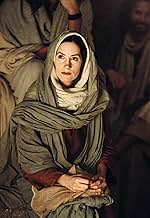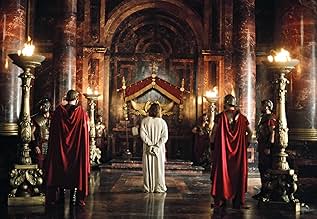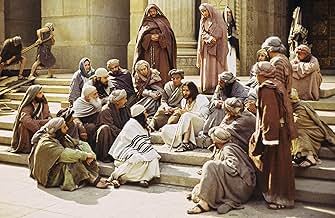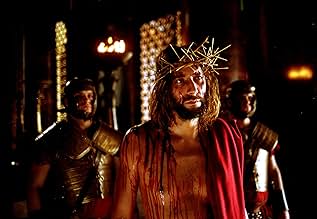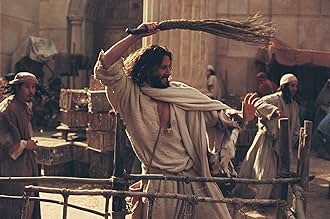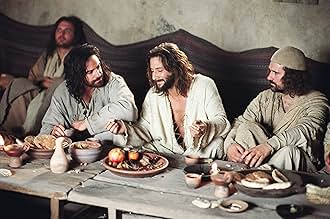IMDb-BEWERTUNG
7,7/10
4482
IHRE BEWERTUNG
Füge eine Handlung in deiner Sprache hinzuThe story of Jesus' life as told by the apostle John, narrated by Christopher Plummer.The story of Jesus' life as told by the apostle John, narrated by Christopher Plummer.The story of Jesus' life as told by the apostle John, narrated by Christopher Plummer.
- Regie
- Drehbuch
- Hauptbesetzung
- Auszeichnungen
- 1 Gewinn & 3 Nominierungen insgesamt
Christopher Plummer
- Narrator
- (Synchronisation)
Paul Alexander Nolan
- Bridegroom
- (as Paul Nolan)
Heinar Piller
- High Official #3
- (as Heinar Pillar)
Empfohlene Bewertungen
I loved this movie, and I am actually a Muslim. The fact that the screenplay is so word for word faithful adds alot to the movie. And the acting and directing are fantastic. The film does a wonderful job of making you feel what life was like for Jesus, his disciples, and those he came across. I hope there will be such films made of the other gospels soon.
I have seen "King of Kings", "The Greatest Story Ever Told", "Jesus of Nazareth", "The Jesus Film", "Jesus Christ, Superstar", and now, "The Gospel According to John." This, to me, is the most scriptural presentation so far. The acting was superb considering the actors had to contend with a dialogue that was taken straight out of the Bible. The actor who portrayed Jesus (Cusick) gave a very refreshing portrayal of Jesus, the man. I especially liked it when he smiled! I remember Max von Sydow's and Robert Powell's portrayal of Jesus and they were too "somber"...
It seemed like I was reading the Gospel of John while watching the film. Though the movie was quite long (the gospel account has 21 chapters!),I was never bored.
It seemed like I was reading the Gospel of John while watching the film. Though the movie was quite long (the gospel account has 21 chapters!),I was never bored.
I have seen all the Jesus movies and all are a little bit too stylized. This movie I felt was real. It is verbatim, and it shows what the day to day living was like for Jesus and his times. I especially liked the carpenter scene. I have always believed that Jesus was as an ordinary man until the time was right. That he would have had to work for a living. That he would have fulfilled all of his father's commands, including the one which state that we had to toil for our bread. I felt the frustration but loving patience of our Lord, as he tried to convince his people, the Jews, that he was the one and that their hour was now. He succeeded in splitting the Jews into believers and non-believer and that condition exist to this day not only for them but for all who hear the message. Jesus is personal and approachable. I am looking forward to the PASSION, since this movie is about the last 12 hours of Jesus's life amongst us. To be told in a 3 hour movie also. I just hope the Gospels are all made an illustrated with the beauty, simplicity, faithfulness and Love of this movie.
There are four gospels in the New Testament. Matthew, Mark and Luke are referred to as the `synoptic' gospels. They see Jesus `with the same eye'. Their `eyewitness accounts' are remarkably alike. John is startlingly different in its details, style and tone -- so much so, that this gospel almost didn't make it into the accepted canon of New Testament books.
`The Gospel of John' purports to be a faithful retelling of the fourth gospel. It employs every single word of the text, as rendered by the Good News Bible translation. The film combines dialogue with narration by veteran actor Christopher Plummer. The result is an understandably wordy script. One of my friends used the term `verbose'.
Was it wise or foolish to adopt this approach? That depends on your point of view. It means that the actor playing Jesus must deliver lengthy speeches, especially Jesus' farewell after the Last Supper. This runs the risk of being a deadly bore in cinematic terms. I must confess, I kept nodding off during this segment of the film. To his credit, the director tries to compensate by cutting away to a montage of black-and-white flashback images suggested by Jesus' words. This gives the audience a much-needed visual breather.
On the other hand, and this is a good thing, using the integral text of John's gospel obliges us truly to listen -- to hear the Word. I lost track of how often Jesus said, `I am telling you the truth.' Some might find this annoyingly repetitive. But it certainly hammers home the theme of John's gospel. As if in counterpoint to Pilate's cynical barb, `What is truth?' we have Jesus' ringing declaration, `I am the Truth!' (This is often obscured by older translations, such as `Amen, amen, I say to you'.)
I found `The Gospel of John' highly instructive, not just for what it says, but what is does not say. I realized, for the first time, why John recounts events absent from Matthew, Mark and Luke, while ignoring those familiar to us from their accounts. It struck me that the author of the fourth gospel assumes we are already conversant with all this material. For instance, John does not describe the institution of the Eucharist at the Last Supper, yet abounds in references to bread and wine. Again, John does not tell us what became of John the Baptist (he was beheaded by Herod) or Judas the traitor (he hanged himself). John takes it for granted that we know.
I also realized how often Jesus says, `I am who I am' (three times) and finally, `Before Abraham was, I am.' Jesus applies to Himself the phrase used by Yahweh in the Old Testament as His name. In other words, in John's gospel, Jesus clearly equates Himself with God (`The Father and I are one').
As represented in this film, Jesus is thoroughly human in that He suffers and dies. Yet He also radiates the power of divinity -- not so much in the form of miracles, as in a sense of righteousness, a certainty about His mission. Even Jesus' outrage at the commercialization of Temple worship seems more like the fulmination of an exasperated Old Testament God. We do not see Jesus tempted by Satan or agonizing in the garden of Gethsemane. Jesus knows exactly who He is and what He is doing, even though His followers may not.
The real `stars' of the film are Jesus' opponents, `the Jewish authorities' (Pharisees, Sadducees and scribes) and their hapless instrument, Pontius Pilate. The apostles, on the other hand, are curiously lifeless in this film rendering of John's gospel. Even Judas is given little in the way of motivation. John's explanation is that he was a thief who pilfered the apostles' common purse and sold His master out of simple greed. This explanation may have been enough for the evangelist, but it is far from satisfying in literary or cinematic terms.
The film portrays Mary, the mother of Jesus, as a woman of mature years. Her visual representation comes as something of a shock, compared to Olivia Hussey's incarnation of the Virgin in `Jesus of Nazareth'. I was reminded of Michelangelo's Pietà. Someone pointed out to the sculptor that the mother looked strangely younger than the son. Michelangelo replied that, since the Virgin had been pure and sinless, he could not imagine her aging and decaying. Jesus' mother in `The Gospel of John' thus runs counter to a certain iconographic tradition.
The other women in this film, as in John's gospel, get short shrift. We barely get any sense of Mary Magdalen, or Mary and Martha of Bethany. The most fully developed female character is the Samaritan at the well, played by an actress whose face and voice deliver exactly the right note of hard-bitten cynicism. One only wishes she were not so wild-eyed once she realizes she is speaking to the promised Messiah.
The same excessive theatricality is found in John the Baptist, Nathanael (whom Jesus saw beneath the fig tree before meeting him) and doubting Thomas (whose exclamation, `My Lord and my God!' rings hollow).
A film such as `The Gospel of John' cannot be judged entirely according to the usual canons of cinematic art. In other words, we cannot judge `The Gospel of John' simply on the basis of artistic merit or entertainment value. Ultimately, we must ask: Is the film theologically sound? Does it succeed in conveying the gospel message? How do we, the audience, respond to that message and especially the messenger, Jesus Himself?
In the final analysis -- and this is a question all filmgoers must answer for themselves -- would we heed the Jesus of `The Gospel of John' when He invites us to `Follow me'?
`The Gospel of John' purports to be a faithful retelling of the fourth gospel. It employs every single word of the text, as rendered by the Good News Bible translation. The film combines dialogue with narration by veteran actor Christopher Plummer. The result is an understandably wordy script. One of my friends used the term `verbose'.
Was it wise or foolish to adopt this approach? That depends on your point of view. It means that the actor playing Jesus must deliver lengthy speeches, especially Jesus' farewell after the Last Supper. This runs the risk of being a deadly bore in cinematic terms. I must confess, I kept nodding off during this segment of the film. To his credit, the director tries to compensate by cutting away to a montage of black-and-white flashback images suggested by Jesus' words. This gives the audience a much-needed visual breather.
On the other hand, and this is a good thing, using the integral text of John's gospel obliges us truly to listen -- to hear the Word. I lost track of how often Jesus said, `I am telling you the truth.' Some might find this annoyingly repetitive. But it certainly hammers home the theme of John's gospel. As if in counterpoint to Pilate's cynical barb, `What is truth?' we have Jesus' ringing declaration, `I am the Truth!' (This is often obscured by older translations, such as `Amen, amen, I say to you'.)
I found `The Gospel of John' highly instructive, not just for what it says, but what is does not say. I realized, for the first time, why John recounts events absent from Matthew, Mark and Luke, while ignoring those familiar to us from their accounts. It struck me that the author of the fourth gospel assumes we are already conversant with all this material. For instance, John does not describe the institution of the Eucharist at the Last Supper, yet abounds in references to bread and wine. Again, John does not tell us what became of John the Baptist (he was beheaded by Herod) or Judas the traitor (he hanged himself). John takes it for granted that we know.
I also realized how often Jesus says, `I am who I am' (three times) and finally, `Before Abraham was, I am.' Jesus applies to Himself the phrase used by Yahweh in the Old Testament as His name. In other words, in John's gospel, Jesus clearly equates Himself with God (`The Father and I are one').
As represented in this film, Jesus is thoroughly human in that He suffers and dies. Yet He also radiates the power of divinity -- not so much in the form of miracles, as in a sense of righteousness, a certainty about His mission. Even Jesus' outrage at the commercialization of Temple worship seems more like the fulmination of an exasperated Old Testament God. We do not see Jesus tempted by Satan or agonizing in the garden of Gethsemane. Jesus knows exactly who He is and what He is doing, even though His followers may not.
The real `stars' of the film are Jesus' opponents, `the Jewish authorities' (Pharisees, Sadducees and scribes) and their hapless instrument, Pontius Pilate. The apostles, on the other hand, are curiously lifeless in this film rendering of John's gospel. Even Judas is given little in the way of motivation. John's explanation is that he was a thief who pilfered the apostles' common purse and sold His master out of simple greed. This explanation may have been enough for the evangelist, but it is far from satisfying in literary or cinematic terms.
The film portrays Mary, the mother of Jesus, as a woman of mature years. Her visual representation comes as something of a shock, compared to Olivia Hussey's incarnation of the Virgin in `Jesus of Nazareth'. I was reminded of Michelangelo's Pietà. Someone pointed out to the sculptor that the mother looked strangely younger than the son. Michelangelo replied that, since the Virgin had been pure and sinless, he could not imagine her aging and decaying. Jesus' mother in `The Gospel of John' thus runs counter to a certain iconographic tradition.
The other women in this film, as in John's gospel, get short shrift. We barely get any sense of Mary Magdalen, or Mary and Martha of Bethany. The most fully developed female character is the Samaritan at the well, played by an actress whose face and voice deliver exactly the right note of hard-bitten cynicism. One only wishes she were not so wild-eyed once she realizes she is speaking to the promised Messiah.
The same excessive theatricality is found in John the Baptist, Nathanael (whom Jesus saw beneath the fig tree before meeting him) and doubting Thomas (whose exclamation, `My Lord and my God!' rings hollow).
A film such as `The Gospel of John' cannot be judged entirely according to the usual canons of cinematic art. In other words, we cannot judge `The Gospel of John' simply on the basis of artistic merit or entertainment value. Ultimately, we must ask: Is the film theologically sound? Does it succeed in conveying the gospel message? How do we, the audience, respond to that message and especially the messenger, Jesus Himself?
In the final analysis -- and this is a question all filmgoers must answer for themselves -- would we heed the Jesus of `The Gospel of John' when He invites us to `Follow me'?
10cubes007
This film was surprisingly very good. Unlike Mel Gibson's "The Passion of Christ" this movie can serve both Christians and non-Christians as a cohesive educational experience. But this isn't a boring, conservative Christian movie. All really good dramas are character-driven and the potrayal/interpretation of Jesus in this movie is so strong that if I were the crying type I very well might have. Jesus is very genuine, compassionate, emotional, yet self-controlled. At first I wasn't quite sold by Henry Ian Cusick's style, but his sincerity was really consistent throughout the movie and I was convinced about 20 minutes into the movie at most. Other users have commented on how they were surprised by Jesus's impatience with the discples or loud tone when speaking to the Pharisees but I have to say, if you've read the Gospels then you should expect Jesus to be demonstrative and uninhibited, as circumstances dictate.
As others have said, this movie is a faithful adaptation of the gospel of John. I thought that having every single word of the book either spoken by characters or narrated was a necessary and intelligent decision to make. To hear the Word allows you to consider the actors & director's interpretation of certain events & verses, and also to simply consider the Word for yourself in a comprehensive manner. After all, how often does one ever read straight through the book of John?
Watching this movie really helps the Christian understand Jesus' incredibly difficult situation. I'm not talking about the crucifiction, but the fact that Jesus as the Son of God is incarnated into a man and has to tell men who he really is. To put it more clearly, imagine if God incarnate stood before you as an average looking human being and said "I am the Son of God." Unless you saw a miracle it you would not be willing to suspend disbelief. I empathized with Jesus when he emphatically said, "I am telling you the truth!" so many times throughout the movie.
In conclusion, this movie is really worth your time to watch. Although it is very long and you may lose focus at times during the middle portion I would still highly recommend it. It isn't perfect but overall it's a fantastic piece of work.
As others have said, this movie is a faithful adaptation of the gospel of John. I thought that having every single word of the book either spoken by characters or narrated was a necessary and intelligent decision to make. To hear the Word allows you to consider the actors & director's interpretation of certain events & verses, and also to simply consider the Word for yourself in a comprehensive manner. After all, how often does one ever read straight through the book of John?
Watching this movie really helps the Christian understand Jesus' incredibly difficult situation. I'm not talking about the crucifiction, but the fact that Jesus as the Son of God is incarnated into a man and has to tell men who he really is. To put it more clearly, imagine if God incarnate stood before you as an average looking human being and said "I am the Son of God." Unless you saw a miracle it you would not be willing to suspend disbelief. I empathized with Jesus when he emphatically said, "I am telling you the truth!" so many times throughout the movie.
In conclusion, this movie is really worth your time to watch. Although it is very long and you may lose focus at times during the middle portion I would still highly recommend it. It isn't perfect but overall it's a fantastic piece of work.
Wusstest du schon
- WissenswertesThe dialog follows the Good News Bible, word for word, in sequential order from beginning to end.
- PatzerAfter Jesus performs his first miracle of turning the water into wine at the wedding feast, he pours the wine into what appears to be a plastic cup (to help us see the color of what was water). Actually, colorless glass has been around since approximately the 9th century BC.
- Zitate
Jesus Christ: A person who has had a bath needs only to wash his feet; his whole body is clean, and you are all clean, all except one.
- VerbindungenFollows The Visual Bible: Matthew (1993)
- SoundtracksSymphony No.5
Music by Valentin Silvestrov
Performed by The Ural Philharmonic Orchestra
Conducted by Andrey Boreyko
Produced by Megadisc
Top-Auswahl
Melde dich zum Bewerten an und greife auf die Watchlist für personalisierte Empfehlungen zu.
- How long is The Gospel of John?Powered by Alexa
Details
- Erscheinungsdatum
- Herkunftsländer
- Sprache
- Auch bekannt als
- The Gospel of John
- Drehorte
- Tabernas, Almería, Andalucía, Spanien(Cave scene)
- Produktionsfirmen
- Weitere beteiligte Unternehmen bei IMDbPro anzeigen
Box Office
- Budget
- 10.000.000 $ (geschätzt)
- Bruttoertrag in den USA und Kanada
- 4.069.090 $
- Eröffnungswochenende in den USA und in Kanada
- 98.363 $
- 28. Sept. 2003
- Weltweiter Bruttoertrag
- 4.078.741 $
- Laufzeit
- 3 Std.(180 min)
- Farbe
- Sound-Mix
- Seitenverhältnis
- 1.85 : 1
Zu dieser Seite beitragen
Bearbeitung vorschlagen oder fehlenden Inhalt hinzufügen




